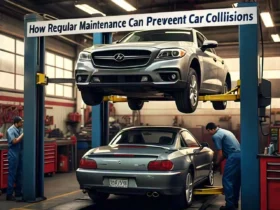Are you planning to buy a new car battery but need to know whether it comes pre-charged or not? Many people often overlook this question, but it’s an important one. As someone who has experienced the inconvenience of a dead battery, knowing whether your new battery comes charged can save you a lot of time and hassle.
In this blog post, we’ll answer the question, “do car batteries come charged?” in detail. We’ll explore Why Companies charge batteries at the factory and provide tips on properly charging your new battery if it does not come charged. We’ll also guide you about what factors you should keep in your mind before buying a car battery.
Whether you’re a seasoned driver or a first-time car owner, this blog post will provide valuable insights to help you decide when buying a new car battery. So, let’s get started and find out whether car batteries come charged or not!
Do car batteries come charged?
Yes, car batteries can come charged from the factory. Some manufacturers pre-charge their car batteries before shipping them out to ensure they are ready to use straight out of the box. However, not all car batteries come charged, so it’s important to check the battery’s charge level before using it. If the battery is not charged, it will need to be charged before use.
Why do Companies charge batteries at the factory before you buy them?
Although there are various factors that are important to consider while answering this question. Below are some main points that you must know;
Customer Convenience
Charging batteries at the factory ensures they are ready to use straight out of the box. If a battery was not charged at the factory, the customer would need to charge it before using it, which would be inconvenient.
Shelf Life
Charging batteries at the factory helps to extend their shelf life. Batteries left uncharged for long periods can lose their charge and may even become damaged. By charging batteries at the factory, companies can ensure they are stored in the best possible condition, ready for use whenever needed.
Battery Life
Charging batteries at the factory also helps to reduce the risk of battery failure. When a battery is not charged for a long time, it can lead to the build-up of sulfate crystals on the battery plates, which can reduce its capacity and shorten its lifespan. By charging batteries at the factory, companies can ensure that the batteries are properly conditioned, reducing the risk of failure.
Overall Performance
Charging batteries at the factory can also help to improve their overall performance. It tends to have higher energy density and longer cycle life than those not charged before leaving the factory.
5 Signs Your Car Battery Needs To Be Replaced
Your car battery is an essential component of your vehicle that provides the power needed to start the engine and run the electronics. However, like all batteries, it has a limited lifespan and will eventually need to be replaced. We will discuss some signs that your car battery needs to be replaced.
1. Difficulty in Starting the Car
If your car battery is having difficulty starting your car, it is the first indication that it needs replacement. If you observe that the engine is cranking slowly or the car takes more time than usual to start, it is a possible sign that the battery is losing its charge and necessitates replacement.
2. Electrical Issues
Another sign that your car battery needs to be replaced is if you’re experiencing electrical issues. If you notice that your lights are dimmer than usual or that your power windows are moving slower than normal, this could be a sign that your battery is losing its charge and needs to be replaced.
3. Battery Warning Light
In addition to these signs, you may also notice that your car’s battery warning light is illuminated on your dashboard. This warning light is an indication that your battery is not charging properly and may need to be replaced.
4. Slow Cranking
One of the most common signs of a weak car battery is when it’s slow to crank. If your car takes a while to start, it could be a sign that your battery is not holding its charge as well as it should. If you hear a clicking sound when you turn the key, this could be an indication that the battery is not providing enough power to start the engine.
5. Dim Headlights
Another symptom of a weak car battery is that car headlights are dimmer than usual. This is because the battery is not able to provide enough power to the electrical components of your car. Similarly, suppose interior lights are not as bright, or your power windows are slower than usual. In that case, this could also be a sign of a weak battery.
How to test a car battery? 2 Easy Steps
Regularly testing your car battery can provide a range of benefits that can save you time, money, and hassle in the long run. Two mostly used methods to test car battery are outlined below;
1. Using Voltmeter
The easiest way to test your car battery is to use a voltmeter. This is a device that measures the voltage of the battery and can provide a quick indication of its health. To use a voltmeter, simply connect the positive and negative probes to the corresponding terminals on the battery. A healthy battery should read around 12.6 volts when the engine is off.
2. Load Test
Another way to test your car battery is to perform a load test. This involves using a specialized battery tester that simulates the load of starting the engine. The tester will measure the voltage drop as the load is applied and provide a more accurate indication of the battery’s health. A healthy battery should maintain at least 9.6 volts under load.
If you’re not comfortable testing your car battery yourself, you can always have it tested by a professional. Many auto parts stores offer free battery testing, and they can provide a more detailed analysis of the battery’s health
7 Factors to consider while purchasing a new car battery
Buying a new car battery can be a confusing process, especially if you’re not familiar with the different types and features available. Here are some factors to consider when purchasing a new car battery:
1. Battery Type
There are two main types of car batteries: lead-acid and lithium-ion. Lead-acid batteries are the most common and are typically more affordable, while lithium-ion batteries are lighter and more durable but can be more expensive.
2. Size and Compatibility
Make sure to check your vehicle’s owner’s manual to determine the correct battery size and specifications for your car. Buying a battery that is not compatible with your car can result in poor performance and potential damage.
Cold Cranking Amps (CCA)
CCA is a measurement of a battery’s ability to start the engine in cold weather. The higher the CCA rating, the better the battery will perform in colder temperatures.
Reserve Capacity (RC)
RC is a measurement of how long a battery can provide power in the event of an alternator failure. A higher RC rating means the battery can provide power for longer without needing to be recharged.
Brand and Quality
It’s important to choose a reputable brand and a high-quality battery to ensure reliability and longevity.
Warranty
Look for a battery with a good warranty to protect your investment and provide peace of mind.
Price
While price shouldn’t be the only factor you consider, it’s important to compare prices and choose a battery that fits your budget.
By considering these factors when purchasing a new car battery, you can make an informed decision and choose a battery that meets your needs and fits your vehicle.
Conclusion
When it comes to maintaining your car battery, regular testing and maintenance can ensure that it’s performing at its best and providing the power your car needs. By understanding the signs of a weak or failing battery and taking action to address any issues, you can help prevent unexpected breakdowns and avoid costly repairs or replacements down the line.
In the end, taking care of your car battery is an essential part of vehicle maintenance that can help ensure reliable performance and extend the life of your battery. So, whether you’re installing a new battery or maintaining an existing one, make sure to follow best practices and stay on top of regular testing and maintenance to keep your car running smoothly.
Frequently Asked Questions (FAQs)
How do you know if your car alternator has a problem?
If you notice dimming or flickering headlights, a dead battery, or difficulty starting your car, it could be a sign that your alternator is failing. Additionally, a warning light on your dashboard may illuminate to indicate an issue with the charging system.
How long does a car battery hold its charge?
The length of time a car battery can hold its charge varies depending on the type of battery and usage patterns. Generally, a fully charged car battery can hold its charge for several weeks to a few months, depending on factors such as temperature, age, and usage.
How long do car batteries last?
The lifespan of a car battery can vary depending on the type of battery, driving conditions, and maintenance. On average, a car battery lasts between 3-5 years, but it can last longer with proper maintenance and care. Regular testing and maintenance can help extend the life of your battery and prevent unexpected breakdowns.











